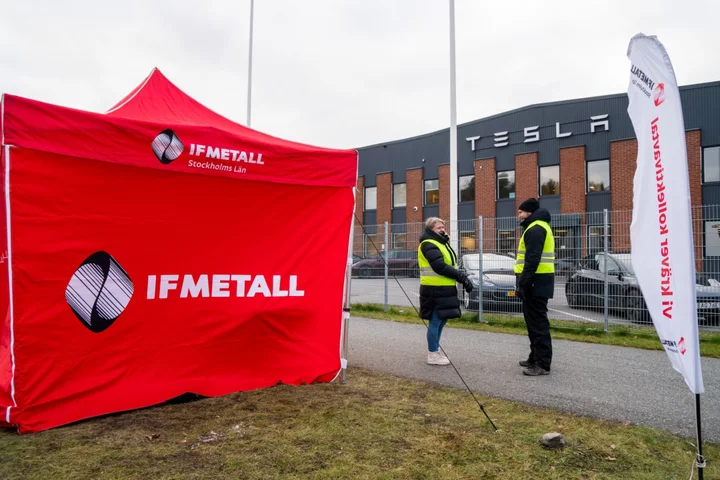For the past week, not a single Tesla has passed through Sweden’s four biggest ports. Starting Friday, broken Superchargers won’t get repaired. Next week, parts deliveries to repair shops and garbage pickups will stop.
Such are the repercussions of Swedish unions flexing their muscles against the world’s biggest electric-car company. While the effects of a strike at Tesla Inc.’s seven repair shops in the country are a far cry from what could come of efforts to unionize factories in Germany and the US, they’re indicative of how powerful and pervasive labor groups are in an important market for Elon Musk.
The anti-union billionaire has successfully fended off organizing efforts for years. If he meets his match in Sweden — where two in three working adults belong to a union and close to 90% are employed at workplaces with collective bargaining agreements — it could set a precedent for how labor groups take on the company elsewhere, at a time when Musk is eager to cut costs.
The dust-up started Oct. 27, when the IF Metall union called a strike in what is Tesla’s fifth-biggest market in Europe. In a show of solidarity, the Swedish Transport Workers’ Union stopped loading and unloading the company’s cars at Sweden’s four main harbors beginning Nov. 7.
At the picket line outside Tesla’s service center in the Stockholm suburb of Segeltorp, the temperature inched a couple degrees below freezing Thursday afternoon. The two strike guards on duty — Daniel Lonnquist and Birgitta Wahlberg — huddled next to a propane heater under a bright red tent.
“A lot of people are positive. People stop to say hi, car drivers honk their horns,” said Lonnquist, 47. “Even a lot of Tesla owners have approached us saying they support what we are doing.”
Joining IF Metall was a no-brainer for Lonnquist 23 years ago. The country lacks a national minimum wage and other workplace practices, leaving the setting of those standards to the collective bargaining process between unions and employers.
While Tesla’s operations in Sweden may be limited, a company of its global prominence bucking local practices would undermine the broader labor model, according to Jesper Hamark, visiting research fellow at the University of Gothenburg.
“For the Swedish labor union movement, the question is exponentially bigger than these seven repair shops,” Hamark said. “Tesla’s actions threaten the entire Swedish labor market system.”
In a Nov. 7 statement, Tesla called IF Metall’s strike “unfortunate.” The company said it adheres to Swedish labor market regulations, already offers equivalent or better agreements than those covered by collective bargaining and would remain in open dialogue with the union.
It’s not the first time Swedish labor has clashed with a US company. In 1995, Toys “R” Us initially refused to sign a collective bargaining agreement. After a three-month strike by the Swedish Commercial Employees’ Union, the retailer caved.
Much has changed since, with union membership in Sweden falling from close to 90% to around 66%. While that’s still among the highest among OECD countries, unions’ influence has waned as a new generation of workers enter a more service and technology-based labor market.
Efforts to stem the tide by taking on one of the world’s most recognizable brands are drawing support from outside Sweden. Germany’s IG Metall, which has been trying to unionize Tesla’s factory in Grunheide, Germany, issued a statement last week pledging its full support.
“Your strike also gives our colleagues in Grunheide courage and confidence to organize themselves into a union and take their fate into their own hands,” IG Metall said.
Sweden allows significant leeway for sympathy actions across unions, which are restricted in Germany and were outright banned in the UK in the early 1990s, Hamark said. That’s what’s allowed Tesla’s strike at repair shops to spill over to unionized dockworkers, electricians and cleaning staff.
Starting Nov. 21, no mail or packages will be delivered by employees of PostNord AB, Sweden’s national postal service. The Swedish Building Workers’ Union also has said its members will refuse all work at Tesla sites from Nov. 28.
IF Metall also announced Thursday that it plans to block work at a factory in Sweden that supplies aluminum components to Tesla’s German factory starting Nov. 24.
There may be an end-around for Tesla to settle the strike without having to accept unionization. When Amazon.com Inc. set up shop in Sweden two years ago, the company subcontracted with a logistics firm that had a collective bargaining agreement with a local union.
The industrial workers’ union has indicated it wouldn’t be averse to such a solution in Tesla’s case.
“For us, it wouldn’t matter,” Veli-Pekka Saikkala, IF Metall’s chief negotiator, told state radio broadcaster Swedish Radio earlier this week. “Wherever our members work, there should be a collective bargaining agreement. When that is in place, we have achieved our goal.”

